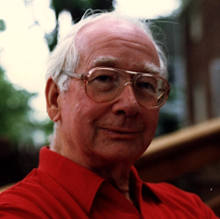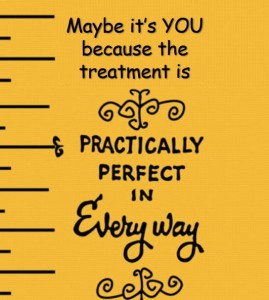Take a good look at the picture below. Do you recognize this person?
 Let me give you a hint. In 1974, he published the first empirical study documenting one of psychotherapy’s most closely held secrets: some therapists are more effective than others.
Let me give you a hint. In 1974, he published the first empirical study documenting one of psychotherapy’s most closely held secrets: some therapists are more effective than others.
It’s true. You know it. I know it. Everyone knows it. We just don’t talk about it openly.
The man in the photo is psychologist David F. Ricks, author of “Supershrink: Methods of a Therapist Judged Successful on the Basis of Adult Outcomes of Adolescent Patients.” And until the publication of this post, no public images of him were available. Not a single photo on the net. Hard to believe in our digital age (I promise to explain how I managed to get this picture later on in the post).
Confirming the controversial and uncomfortable nature of the subject, Rick’s article, though groundbreaking, is rarely cited. Google Scholar reports a mere 154 citations over the last forty-four years–and most of those are by the same, small group of authors! More to the point, how to explain the finding that kids treated by one therapist fared far better in adulthood than those cared for by another?
Now, as then, the dominant belief is that any differences in outcome are attributable to the client, their pretreatment level of dysfunction, and the environment in which they live.  In Rick’s (1974) study, however, extreme care was taken to ensure the adolescents seen by different therapists were matched on all such possible variables (e.g., level of functioning/severity, gender, IQ, economic class, age, ethnic background, time period treated, level of familiar and parental pathology). The results were dramatic, if not shocking. One the basis of their level of adjustment as adults, seventy-five percent of those seen by the top performing clinician had a positive outcome. By contrast, 84% of those treated by the other practitioner were classified as having a “schizophrenic outcome.”
In Rick’s (1974) study, however, extreme care was taken to ensure the adolescents seen by different therapists were matched on all such possible variables (e.g., level of functioning/severity, gender, IQ, economic class, age, ethnic background, time period treated, level of familiar and parental pathology). The results were dramatic, if not shocking. One the basis of their level of adjustment as adults, seventy-five percent of those seen by the top performing clinician had a positive outcome. By contrast, 84% of those treated by the other practitioner were classified as having a “schizophrenic outcome.”
Had the kids been asked at the time, the field would not have had to wait so long to discover the factor responsible for their success. Indeed, all were aware of the important role their therapist played in their lives. Looking back as adults, they affectionately recalled referring to the clinician who had treated them as “the supershrink”–even going so far as to encourage other kids to seek out this particular person for help.
Despite these results, thirty-years would pass before another empirical analysis appeared in the literature (Okiishi, Lambert, Nielsen, & Ogles, 2003). The size and scope of this later study dwarfed Rick’s, examining results from standardized measures administered on an ongoing basis to over 1800 people treated by 91 therapists. The findings? Those seen by the most effective clinicians experienced a rate of improvement 10 time greater than the mean for the entire sample. Meanwhile, those treated by the least effective, could expect to feel the same or worse than when they started, even after attending 3 times as many sessions!
Isn’t it time our field confronts reality and asks, “why are some therapists more effective than others?” Clinicians invest a great deal of time, energy, and money in professional growth. They undergo personal therapy, receive ongoing postgraduate supervision, and attend continuing education (CE) events (Rønnestad & Orlinsky, 2005). Nevertheless, one searches in vain for any evidence that such efforts help therapists accomplish their goal (Miller, Hubble, & Chow, 2017).
 After learning a bit more about the life and work of David Ricks, I strongly believe he would counsel us to, “Go for it!” After all, he was a maverick and pioneer. I mean that literally! Born in 1927 in Wilson, Wyoming (population, 32), his log cabin house had no indoor plumbing or electricity. Hot potatoes lovingly prepared by his mother, warmed his bed and hands during the long, cold winter months.
After learning a bit more about the life and work of David Ricks, I strongly believe he would counsel us to, “Go for it!” After all, he was a maverick and pioneer. I mean that literally! Born in 1927 in Wilson, Wyoming (population, 32), his log cabin house had no indoor plumbing or electricity. Hot potatoes lovingly prepared by his mother, warmed his bed and hands during the long, cold winter months.
He literally rode a horse to and from the one-room school house he attended–that is, until the family was forced by the Great Depression to move south in search of more economic opportunities. There, the hardships continued: his father died when he was 15, his mother was often ill, and the family remained poor. Throughout it all, David persisted. Although an elementary school teacher once told his parents, “David can’t learn,” he nonetheless was awarded a full scholarship to attend college, eventually earning a Ph.D. in psychology from the University of Chicago. Over the course of his career, he taught, did research, and was a professor at Harvard, Cornell, and eventually, the University of Cincinnati.
Ever since I first read his study, I’d wondered about the person behind the research. Internet searches, as I mentioned above, were futile. I did learn from a brief online obituary that he had died in March 2004–sadly, just a few years before his findings would begin influencing our own work. I sent letters and emails to various people and Universities, all to no avail.
Recently, I managed to find a potential link to one of his, now adult, children. I reached out via Facebook, and the rest is history. We’ve spoken at length on the phone. In response to my request, I was given a series of photos, including the one in this post. Most special, however, was a personal history Dr. Ricks wrote for his grandchildren. Reading it gave me, I believe, insight into the traits that drove him. When writing about what his parents had taught him to value in life and relationships, he said, first, honesty, and second, courage.
Recent research has finally provided some answers to the question Ricks posed so many years ago (Golberg, Babbins-Wagner, Rousmaniere, Berzins, Hoyt, Whipple et al. 2016): Why are some therapists more effective than others? Put succinctly, the amount of time they engage in deliberate practice is a significant predictor of how effective they become. Indeed, top performing clinicians devote twice as much time to this process than their less effective counterparts. What does it involve? Three things: (1) ongoing measurement of one’s results; (2) continuous identification of specific errors and targets for improvement; and (3) development, testing, and successive refinement of new ways of working.
Still the topic remains controversial and the subject of much misunderstanding. “Please don’t mention anything about supershrinks,” an agency manager advised in hushed tones during a recent phone conversation we were having about topics for a potential in-house training. When I asked, “Why?” they explained, “Clinicians already feel ‘put upon.’ They don’t want to hear about needing to compete with the best.” No wonder this research, I instantly thought to myself, is so off putting. I attempted to clarify, “It’s not about competing with others or even becoming a supershrink, it’s about trying to get a grip on what each of us can do to improve our effectiveness.”
My question to you is, “Did I get the job to do the workshop at that agency?!”
Interested in your responses!
Until next time,
Scott
Scott D. Miller, Ph.D.
Director, International Center for Clinical Excellence
P.S.: Registration for the March 2019 Intensives in Chicago is open. I know it may seem like a long way off in the future, but these trainings have sold out months in advance for the last several years. Click now on the images below to join colleagues from around the world for the fun, interactive, and learning-rich experiences.



Very interesting!!
It’s unbelievable how little research has been done on this subject!
Yes indeed. It is strange that in NZ Psychotherapy teaching and registration demands rigid standards of ones ‘model’ ones experience, personal therapy and supervision. Much of which is entirely peripheral to client outcomes.
I teach graduate students (all are experienced mental health practitioners with master’s degrees studying for a Doctorate in Behavioral Health) how to evaluate and treat patients with psychosomatic illness. A core activity for each student is evaluating, treating and writing a report about one of these patients. The range of quality in these students is quite large, far greater than I see among my colleagues who are medical clinicians. If these students had followed a program of deliberate practice throughout their careers I suspect their individual skills would be greater and the group’s skills less variable.
It is, indeed, immensely worthwhile to at least wonder if not actually discover how therapists can be more effective. I would like to propose a next or a further step that goes beyond preparation, such as devoting more time to deliberate practice, which I have absolutely no doubt is a, if not the, vital key. My suggestion about what actually happens in a session that is a change is that the therapist finds her-/him self providing more support than he or she had for what the client is experiencing, or seems to be experiencing. This degree of support means following the client’s sense of what they say, as best they are able, about what they are experiencing. It also means that the therapist, in his/her attempt to be more supportive, does not distract the client from her or his sense of what he or she is experiencing. In ordinary conversation, we all know what that is like. I have proposed that sustained, sufficient support for the client’s experiencing quite dependably results in the unforced (and therefore not re-traumatizing) activation of the client’s emotional experiencing. (The forced activation of emotional experiencing is not therapeutic and usually occurs outside of session with an unexpected stimulus, though it can occur with a therapist who is too insistent.) Once that starts, all the therapist has to do is to continue to support the client’s experiencing, despite how “emotional” it my seem. In my view, it is a natural psychological healing process that is operating. And as with any such process, we are forced to adopt the role of a mid-wife and support the process.
Thanks Scott, I’ve been aware of your work (and particularly the idea of ‘supershrinks’) for some time, as I came across it in the noughties while studying for my psychology degree. Initially, it was excited because it just made so much sense. But the further into my studies I got, the more it became clear that the industry does not want to hear this stuff. As you say, it goes out of its way to suppress (repress?) it. This fact has become so despiriting – particularly because psychology is allegedly interested in reality – that I decided to take a different career direction. I hope that the field ‘wakes up’ soon – for the sake of both therapists and their clients.
The problem is that many therapists don’t want to know. They are quite comfortable evaluating their clients, but cringe at the suggestion, that in a collaborative relationship, the client may have valuable feedback for the counselor. They provide professional disclosure to the client, but forget that in many ways the client is an expert on themselves. They talk about respecting client autonomy while getting informed consent, but never invite the client to be in the driver’s seat-full participants in their own behavioral health care. They write great sounding treatment goals in their office and expect a dutiful client to sign it in the next session. Of course, when the client doesn’t improve or drops out of treatment, they were “noncompliant” (to someone else’s theory and vision for change).
In some ways implementing FIT and deliberately engaging in continuous performance improvement seems to be all about us. However, at its lowest common denominator, it is about the client. When we keep client outcome first on our agenda, we naturally seek to make the improvements necessary to be as effective as possible with as many people as possible; and when we aren’t we accept that and refer the client to someone else where they may be successful. Keeping our focus on the client and client change is the driving force behind deliberate practice.
Brilliant and touching article. Thank you Scott.
Thanks Scott! I just remembered in the very beginning of my career as psychotherapist. At the end of therapy I asked my clients if there was anything of impotance that stood out for them during our time in therapy. I’ll never forget one of my clients answer: “That time when I had a cold and you made me a cup of tea” It sas not about a partiklar intervention or some other fancy manerism of one supervisor, it was about my own honest way of taking care of her in that particular moment. We all have to learn a method, but we really have to make it our own and evaluate the respons of the client, otherwise it’s like the wheel is spinning but the hamster is dead. See this link: https://giphy.com/gifs/mondays-eBCnpuRGBhQGY
Hi!
I have not been able to find this book or article on the web. Can you help out?
psychologist David F. Ricks, author of “Supershrink: Methods of a Therapist Judged Successful on the Basis of Adult Outcomes of Adolescent Patients.”
All the best
D Eriksson
I was a student of Dr. Ricks at UC in the late 1980s and early 1990s (I took several classes of his). He was by far the greatest teacher I ever had, and one of the greatest human beings I ever met. More than 20 years have passed since I last spoke to him, but I still remember every story he ever told in class (personal experiences, childhood recollections, case studies ) and every conversation I ever had with him in his office during office hours. I teach English and not Psychology, but I believe I learned how to teach from him and quote him to my students and my own children frequently. Yet in all this time as a DF Ricks fan, I had never read anything he wrote except for a few excerpts he showed us in class. But I just now read “Supershrink” and was blown away by all the memories that came flooding back as I read it. He really should be as famous in the field of psychology as Bowlby, Skinner, Piaget, Carl Rogers and Erik Erikson, whose theories he taught me so much about. He was a brilliant man, and one of the kindest, gentlest, most genuine people I have ever met, qualities that don’t always go hand in hand with brilliance.
I believe you got to do the workshop! Did you?